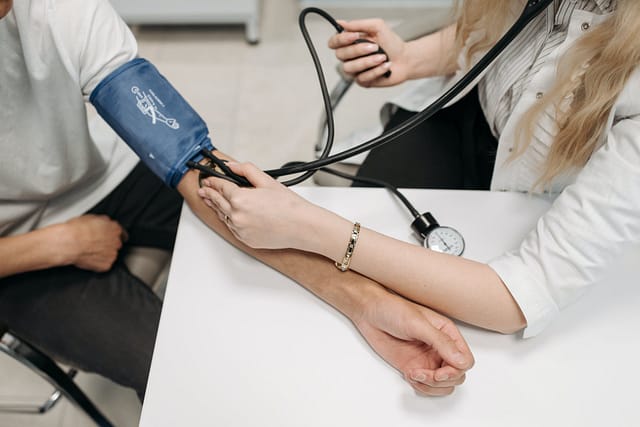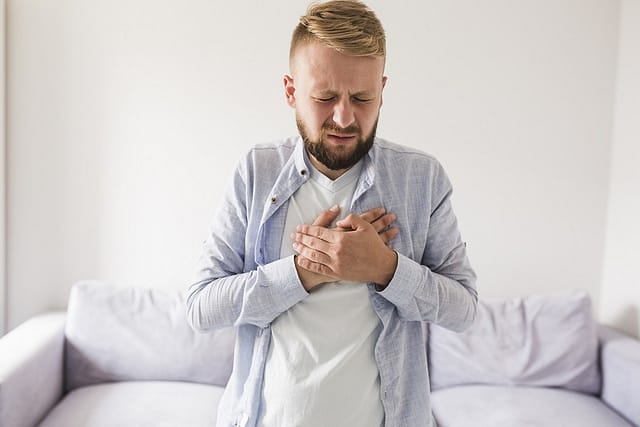
The Damaging Effects of High Blood Pressure on the Body

The blood travels through the vessels and exerts pressure on the walls of the blood vessels; this pressure is called blood pressure—effects of high blood pressure on the body can be threatening and dangerous. Hypertension, or high blood pressure, is when blood exerts more than normal pressure on the blood vessels. When blood pressure is high, it can damage arteries and blood vessel walls over time. If it persists for a long time leads to dangerous complications and even death if left untreated.
Two readings measure blood pressure
Systolic blood pressure: Systolic refers to the pressure when the heart is beating pumps blood around the body
Diastolic blood pressure: the pressure when the heart rests between beats.
A blood pressure reading is considered normal for an average adult below 120/80 mmHg.
High Blood Pressure (Hypertension Readings)
- Stage 1: 130/80.
- Stage 2: 140/90 or higher.
- Hypertensive Crisis: If a blood pressure reading of 180/110 or higher more than once, this high is considered “hypertensive crisis.” Seek medical attention.
High blood pressure has no symptoms until It begins to cause complications. That’s why it’s important to check blood pressure regularly and know the numbers. Below in this articles are the effects of high blood pressure on the systems of the body.
Circulatory system
Damage caused by high blood pressure to the circulatory system begins small and builds over time. The longer it remained undiagnosed or uncontrolled, the more serious are the risks.
Artery Damage
The muscles of the arteries should be flexible and smooth to move blood quickly from the lungs and heart, to get oxygen and supply it to organs and other tissues. When the pressure at which blood travels gets increased, it damage artery walls. That plaque makes the arteries more stiff and narrow, and the flow of the blood is decreased, causing damage to the tissue or organs, leading to chest pain, irregular heartbeat, or a heart attack.
High blood pressure can cause a bulge to form in a damaged artery known as an aneurysm. It gets larger and larger and often isn’t found until it causes pain by pressing on another body area or bursts. A ruptured aneurysm can be deadly if it’s in one of the major arteries. It can happen anywhere in the body.
Aneurysm
When a part of the artery wall weakens due to pressure that creates a bulge or enlargement of the artery is called an aneurysm. If it breaks, it can bleed into the body, and that could be fatal. It’s possible in any artery, but an aneurysm is most common in the aorta, which runs down the middle of the body. If someone has a damaged artery, he or she could get an aneurysm even if you don’t have high blood pressure.
Coronary Artery Disease (CAD)
CAD is caused by plaque builds up in arteries close to your heart. This slows blood flow, causing chest pain or irregular heart rhythm (called an arrhythmia). A total blockage can cause a heart attack.
Heart Attack

When a large plaque builds up, or a clump of it comes loose, to completely block an artery to the heart, it can cause a heart attack. The blockage deprives the heart muscle of oxygen and nutrients, causing its damage. With high blood pressure and blocked arteries, the heart also has to work harder but is less effective. Eventually, the extra load can lead to an enlarged left ventricle, part of the heart that pumps blood to the body, causing a higher risk of having a heart attack. The symptoms are pressure or pain in the chest, but sometimes in the arm, neck, or jaw. It might be hard to breathe, leaving the person dizzy or nauseous.
Peripheral Artery Disease (PAD)
PAD is like CAD, but it affects blood vessels farther from the heart, like those in the arms, legs, head, or stomach causing pain or cramps in the legs, often while walking or climbing stairs. It can also cause tiredness. Peripheral artery disease can cause severe problems like stroke, ulcers, and loss of circulation in the legs, which can cause amputation. It should not be left untreated.
Heart Failure
When the heart becomes so weak and damaged from high blood pressure, working hard, or a previous heart attack, eventually, it gets so weak that it can’t supply enough blood to the body, known as heart failure. Signs of heart failure include:
- shortness of breath
- trouble in breathing
- swelling in the feet, ankles, legs, or abdomen
- feeling tired
High blood pressure can cause the arteries to become narrow, making the heart work harder and weaker.
Enlarged Heart
When the heart has to work harder to pump blood to the body, the heart’s muscle thickens, causing an increase in the size of the heart. The bigger it gets, the tendency to pump blood decreases and tissues might not get the oxygen and nutrients they need.
Nervous system
The damage that high blood pressure causes to blood vessels and arteries in the heart can cause damage to the arteries in the brain.
Dementia
High blood pressure may cause dementia and cognitive decline over time. Reduced blood flow to the brain cells causes memory and thinking problems, resulting in trouble remembering or understand things or losing focus during conversations.
Stroke
When an extended blockage of blood to the brain occurs, it’s called a stroke. If parts of the brain don’t get the oxygen they receive from blood, cells begin to die. Your survival rate and the likelihood of permanent brain damage depends on how severe the stroke is and how fast you receive treatment.
Eye Problems
Blood vessels in the eyes can be damaged as well. Over time, high blood pressure can reduce blood flow to the retina, a light-sensitive layer of tissue at the back of the eyeball. It can also restrict blood travel to the optic nerve, which helps send signals to your brain. If they burst or bleed, it can cause vision difficulties, like blurriness or blindness. Fluid buildup under the retina is called choroidopathy.
Skeletal System

Bone Loss
High blood pressure can cause bone loss, a condition known as osteoporosis, by increasing the amount of calcium during urination. Women of elderly age or those who have already gone through menopause are at an increased risk. Osteoporosis weakens the bones and makes it easier for fractures and breaks to happen.
Respiratory system
As for the brain and heart, the effects of high blood pressure on arteries in the lungs can be damaging. When the artery that carries blood to the lungs gets blocked, it’s called a pulmonary embolism which requires serious medical attention. An aneurysm can also happen in the lungs. Sleep apnoea is a disorder that causes loud snoring and breathing interruptions during a night’s sleep. It makes the throat muscles relax too much and stops the breathing briefly but repeatedly while sleeping. Research has shown that high blood pressure seems to cause sleep apnoea and increases blood pressure since many people diagnosed with sleep apnoea also have high blood pressure.
Reproductive system

Male
The sexual organs use extra blood flow during arousal. High blood pressure causes blockages in the blood vessels hindering blood supply, leading to the penis causing sexual dysfunction. Men may suffer a hard time getting and maintaining an erection.
Female
The body may respond differently because of reduced blood flow to the vagina, both before and during sex. There can also be some difficulty with arousal, and it could be harder to climax. High blood pressure can decrease the sex drive in women.
Urinary system
Kidney Failure
High blood pressure is the second-leading cause of kidney failure. The kidneys help remove waste from the blood, regulate blood volume and pressure, and filter waste out through urine. High blood pressure narrows and hardens the blood vessels of the kidneys restricting special filters, called nephrons, from getting enough blood and nutrients, causing kidney disease and can lead to kidney failure. People with kidney failure either need dialysis or a transplant.
Takeaway
The damage due to hypertension is slow and occurs over a long period without noticeable symptoms. That’s why it’s essential to adopt a healthy lifestyle, like regular exercise and eating a diet low in sugar, salt and unhealthy fats. Everyone should also have their blood pressure checked and know their numbers. Blood pressure can be managed, and being well-aware of the symptoms and causes of high blood pressure can help you control it better.
Sources:
- Effects of high blood pressure (2014).
https://www.cdc.gov/bloodpressure/effects.htm - Health threats from high blood pressure. (2017).
heart.org/HEARTORG/Conditions/HighBloodPressure/LearnHowHBPHarmsYourHealth/Health-Threats-From-High-Blood-Pressure_UCM_002051_Article.jsp#.WXDaCIQrJhE - Mayo Clinic Staff. (2016). High blood pressure (hypertension): Damage to the eyes.
mayoclinic.org/diseases-conditions/high-blood-pressure/in-depth/high-blood-pressure/art-20045868?pg=2 - Mayo Clinic Staff. (2016). High blood pressure (hypertension): High blood pressure dangers: Hypertension’s effects on your body.
mayoclinic.org/diseases-conditions/high-blood-pressure/in-depth/high-blood-pressure/art-20045868 - What are the signs, symptoms, and complications of high blood pressure? (2015).
nhlbi.nih.gov/health/health-topics/topics/hbp/signs





